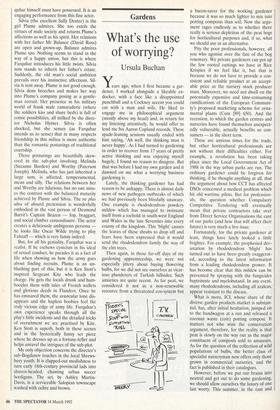Gardens
What's the use of worrying?
Ursula Buchan
Years ago, when I first became a gar- dener, I worked alongside a likeable ex- docker, with a face like a disappointed punchball and a Cockney accent you could cut with a man and wife. He liked to engage me in philosophical argument (mostly above my head) and, in return for my listening attentively, he would offer to lend me his Aaron Copland records. These spade-leaning sessions usually ended with him saying, 'Ah well, the thinking man is never happy'. As I had turned to gardening in order to recover from 17 years of pretty active thinking and was enjoying myself hugely, I found no reason to disagree. But that was before I had my own garden and it dawned on me what a worrying business gardening is.
Lately, the thinking gardener has had reason to be unhappy. There is almost daily news of new pathogen outbreaks of which we had previously been blissfully unaware. One example is rhododendron powdery mildew which has managed to insinuate itself from a toehold in south-west England and Wales in the late Seventies into every cranny of the kingdom. This 'blight' causes the leaves of these shrubs to drop off and fears have been expressed that it would send the rhododendron family the way of the elm trees.
Then again, in those far-off days of my gardening apprenticeship, we were not especially jittery about buying flowering bulbs, for we did not see ourselves as vicar- ious plunderers of Turkish hillsides. Such anxieties are quite recent. As for peat, we considered it not as a non-renewable resource from a threatened eco-system but a bacon-saver for the working gardener because it was so much lighter to mix into potting composts than soil. Now the argu- ment rages endlessly as to whether there really is serious depletion of the peat bogs for horticultural purposes and, if so, what we should use as an alternative.
Pity the poor professionals, however, all you who agonise over the fate of the bog rosemary. We private gardeners can pot up the few rooted cuttings we have in Rice Krispies if we feel like it, but that is because we do not have to provide a con- sistent and reliable product at an accept- able price as the nursery stock producer must. Moreover, we need not dwell on the potentially expensive and time-consuming ramifications of the European Communi- ty's proposed marketing scheme for orna- mental plants (Com [89] 650). And the recession, to which the garden centres and nurseries have found themselves unexpect- edly vulnerable, actually benefits us con- sumers — in the short term.
These are anxious times for the trade, but other horticultural professionals are not without their difficulties either. For example, a revolution has been taking place since the Local Government Act of 1988 in the way urban parks are run. The ordinary gardener could be forgiven for thinking, if he thought anything at all, that the argument about how CCT has affected DSOs concerned a medical problem which hit old wartime pilots. But for profession- als, the question whether Compulsory Competitive Tendering will eventually mean that private contractors take over from Direct Service Organisations the care of our parks (and how that will affect their future) is very much a live issue.
Fortunately, for the private gardener at least, things have lately looked a little brighter. For example, the prophesied dev- astation by rhododendron 'blight' has turned out to have been greatly exaggerat- ed, according to the latest information from a leading rhododendron grower. It has become clear that this mildew can be prevented by spraying with the fungicides bupirimate and myclobutanil. In any event, many rhododendrons, including all azaleas, appear resistant to the disease.
What is more, ICI, whose share of the diverse garden products market is substan- tial, has, after initial hesitation, jumped on to the bandwagon at a run and released a coconut waste (coir) potting compost. It matters not who wins the conservation argument, therefore, for the reality is that peat is slowly on the way out as the major constituent of composts sold to amateurs. As for the question of the collection of wild populations of bulbs, the better class of specialist nurseryman now offers only those grown in commercial nurseries, and the fact 'is published in their catalogues.
However, before we put our brains into neutral and get out to do some gardening, we should allow ourselves the luxury of one last worry. This summer, in the east and south of the country at least, amateurs and professionals alike will have to think up ways of mitigating the worst consequences of a potentially damaging drought. Aaaagh!



























































 Previous page
Previous page